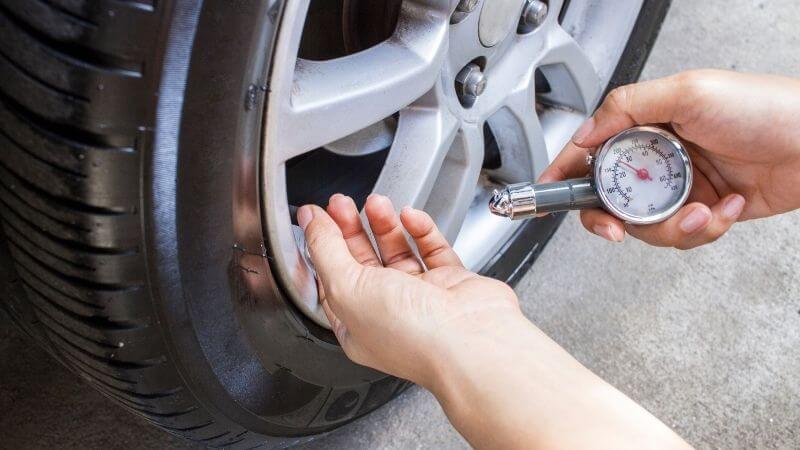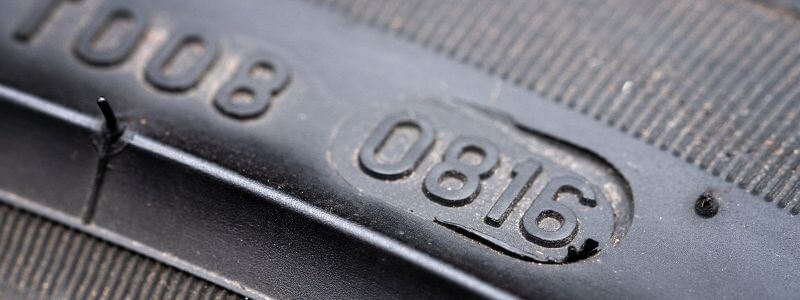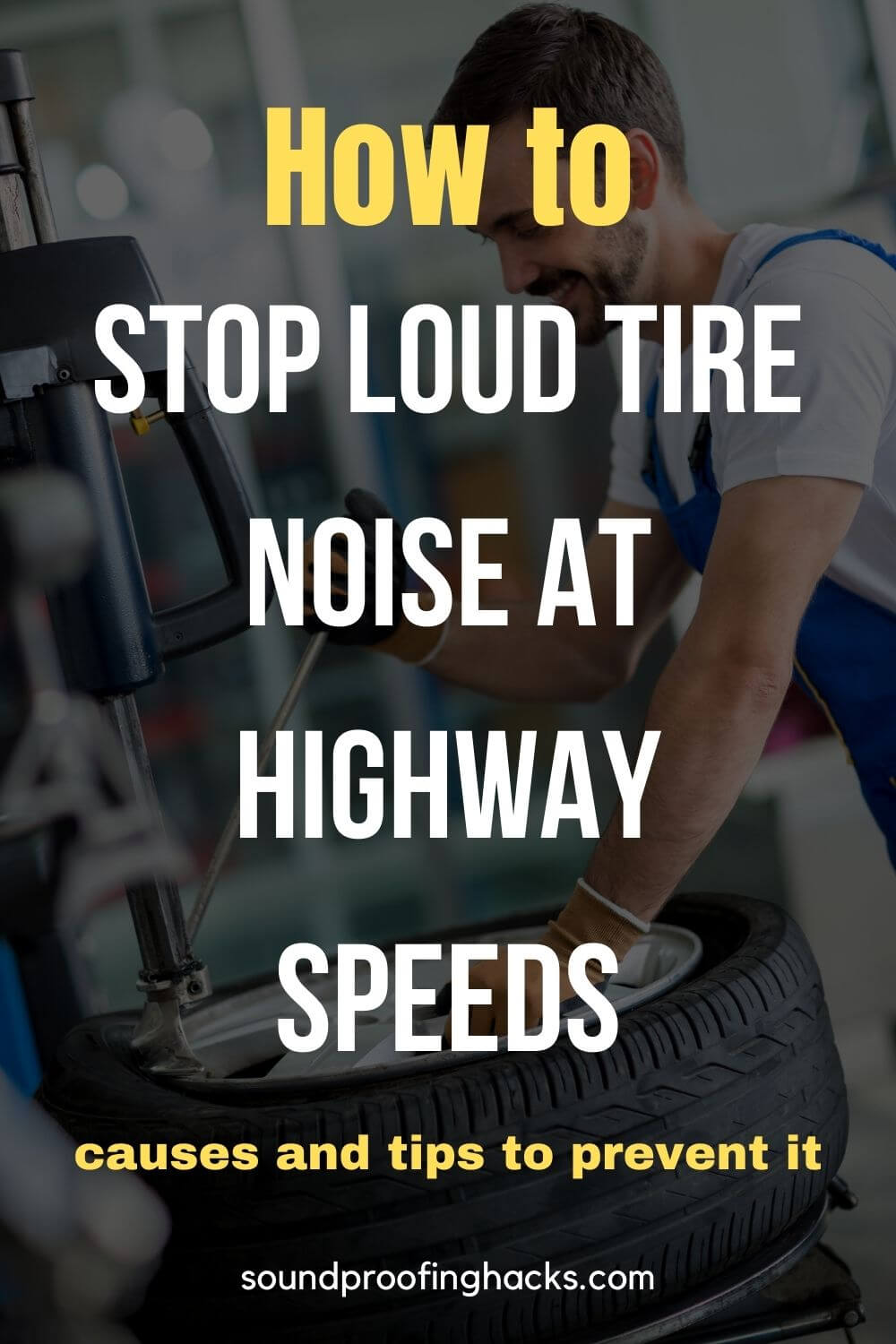Loud Tire Noise At Highway Speeds? Steps To Tone It Down
It can be quite disconcerting when you drive down the highway and you hear loud noises in your vehicle cabin. They are certainly not created to complement the beating of your favorite song, and they sure don’t sound too friendly. What’s going on with all that loud tire noise at highway speeds?
The main causes of loud tire noises at high speeds is down to air being compressed and trapped in the tire grooves. The larger the treads are, the louder the noise will be.
But, there could be other types of noises. In this post, we shall look at the common noises faced and the solutions to fix them.
I am an Affiliate for Amazon and others, which means I may make a commission if you purchase something through the links here. There is NO extra cost to you at all, and THANK YOU so much for the support. Learn more here.
Contents: Skip to section
Causes of loud tire noises when driving
A lot of times, you don’t need to be driving at highway speeds before you start hearing strange noises coming from your tires. Even regular city driving can produce some irregular noises and you should really take them as warning signs.
Normal vehicles do not create abnormal sounds, so if the problem persists, you might want to take your vehicle to a professional mechanic to get it fixed instead.
To learn more about the problem, read on to discover the causes of loud tire noises while driving.
Air inside the grooves of the tire treads
If you are using tires with large treads, that allows more air to be trapped and compressed when driving. Effectively, this means there is a higher volume of air, leading to louder noises. If you are using tires for off roading, towing, or winter, the noise will be much louder as they are designed to have larger or deeper treads.
Problem with tire alignment
When the tires are not aligned properly, they contact the ground in an uneven manner, resulting in camber or one-shoulder wear. You will also notice that your ride is now a lot bumpier. Since the movement of the tires are irregular, they will cause loud noises too.
Damaged CV joints
CV joints, or Constant Velocity joints, are what connects the drive shafts, transmission, and the wheels. When they are damaged, you will tend to hear popping or clicking noises. As the axle loses its flexibility, which causes wobbling. This cause cause loud noises and must be fixed immediately.
Front wheel bearings issue
If you are hearing a screeching kind of noise, that could indicate metal rubbing against metal, and this may be caused by the wheel bearings in your tires. This is more pronounced when you are changing lanes or turning. This is a pretty serious problem and you will have to send it to the workshop to get it inspected. Without the right tools, you will not be able to check it yourself.
Tire rotations
Have you sent your car in to get your tires rotated recently? The purpose of rotation is to ensure even wear and tear, but as you first rotate them, the tread wear on your tires could be uneven, so the parts where there is more rubber in contact with the ground will have more friction. This means louder noises.
Forceful acceleration
When you put your foot to the pedal and try to drive off fast, this causes your car tires to react with a squealing noise. Imagine the tires are spinning in the same spot very quickly. This is a surefire way to create loud noises.
Sudden braking
Just the opposite of a rapid acceleration, sudden braking can cause your tires to squeal and screech. This should not be the case when you drive normally, so if that happens, you will need a mechanic to take a closer look at them.
Too much weight
This might not necessarily be a problem with the tires, but carrying too much weight in your vehicle is going to put a toll on the suspension and tires. While most cars can carry a fair amount of weight, too much will cause it to sink downwards and create a lot of pressure. This is very likely to cause some loud groaning noises.
Not the right tire pressure
Have you seen a flat tire before? Or in fact, you probably hear it before you see it. In a similar way, an underinflated tire can cause loud noises too.
On the other hand, an overinflated tire causes the center part to wear out faster than the edges. This uneven wear and tear also cause imbalance in the contact with the ground, causing loud noises to appear.
I recommend that you check your tire pressures at least once every 1000 miles.

How to stop tire noises?
There are certain steps you can take to ensure the usefulness of your tires, not only to reduce noises but also to make them last as long as possible.
Choosing the right tires
If you have bought a brand new car, you are unlikely to face the issues discussed here. However, if you are driving a used car, the tires might have been changed before, resulting in incompatibility.
You need to figure out what’s more important to you as a driver and understand that different tires will have different sound effects. As I mentioned above, off road or winter tires have larger and deeper treads for better traction, but that also leads to louder noises. So do you need such tires?
If your preference is for a quieter ride, you might want to consider using touring tires or use low rolling resistance tires. They are designed to absorb sounds better, ensuring a calmer ride while driving.
Also, you need to choose the right size tires. Bigger tires means more contact with the ground, resulting in more noises. It would be wise to stick to the size that your car manufacturer has recommended. If you don’t have the manual, it is quite likely you can find the information online. Frankly, I think it’s pretty ugly when you have large 19 inch tires on a regular sedan, but hey, what do I know?
Again, the width of your tires will have a similar effect as its size too. Narrower tires will have a small noise profile that wider ones.
Reducing road noise in car cabin
If you feel that you wish to further reduce road noise in your car cabin, you would do well with a few soundproofing tricks. There are several points in your vehicle where you can work on in order to prevent noise from entering, such as the door, car hood, trunk, and underside of the car.
Fixing these can greatly improve the acoustics within your vehicle while driving.
Regular vehicle inspection
It really pays to bring your car in for an inspection on a regular basis. Personally, I do not like to do it since it costs me money, but I also know that it is for a good reason. I rather spend a small amount upkeeping my car than doling out a huge amount when it breaks down.
Replace old tires
On average, tires can last anywhere from 5-10 years, but that is highly dependant on your driving style, where you drive, as well as how you maintain them. Needless to say, if you “abuse” them regularly, they are not going to last as long as you like.
Check for cracks regularly, as they are a strong indication that they have outlived their usefulness.
If you wish to know how old your tires are, you can check the four digits of the Tire Identification Number listed on your tire. Since 2000, all tires are imprinted with their manufacturing week and year. The first 2 digits represents the week, while the next two digits represent the year. So 0816 means the 8th week of 2016.

Maintenance tips
Tire balancing
When it comes to tires that are not balanced properly, they can start to produce quite a fair bit of loud noises when you drive faster than 40 mph. This is caused uneven wear and tear or a small collision with a curb or possibly going over a pothole hard. Another likelihood is that you have parked the car for too long, leaving flat spots that become imbalanced.
In such cases, you will need to send the car to your mechanic for tire balancing. This should be done around every 3000-5000 miles, but you would know better about how you drive your car. If you have hit something recently, definitely send it in for a check immediately.
Small weights are stuck onto the rims which will balance out stiffer spots, and shouldn’t cost you much more than $20-$50.
Tire rotation
You see, the 4 tires on your car are contacting the ground at different spots each time it moves. You can almost say they have pretty different life experiences. And because of that, they wear out at different rates, which means it would be wise for you to shift them around so that they get exposed somewhat equally.
This will require you to visit a mechanic roughly every 5000 miles or so, and will set you back about $25-$60.
Wheel alignment
If the wheels on your car are misaligned, they can certainly cause loud noises from happening. As it is, the wheels are not parallel to each other, and neither are they perpendicular to the ground. Because of this, the tires get worn out very unevenly and quickly, and in worse cases, damage the suspension too.
If you notice your car “drifting” or hard to drive straight, this is a telling sign that the wheels are not aligned. Send it in to your mechanic to check right away. If not, I would recommend checking them at least once a year.
In conclusion
Taking care of your tires is critical to your safety while driving, and it can prolong their lifespan. The tips in this article will help you ensure that you can use them safely for a long time.
So whether you notice loud tire noise at highway speeds or regular city driving, be sure to take the steps to ensure you are driving with a safe set of wheels!
Other articles that might interest you:
- 4 easy steps: How to make a car exhaust quiet temporarily?
- Second Skin vs Dynamat: Which is better?
- Make your van soundproofing seem like child’s play! 3 easy methods to choose from
- 10 Effective Ideas For Temporary Soundproof Walls
- How to soundproof a basement apartment? 7 easy steps or less

